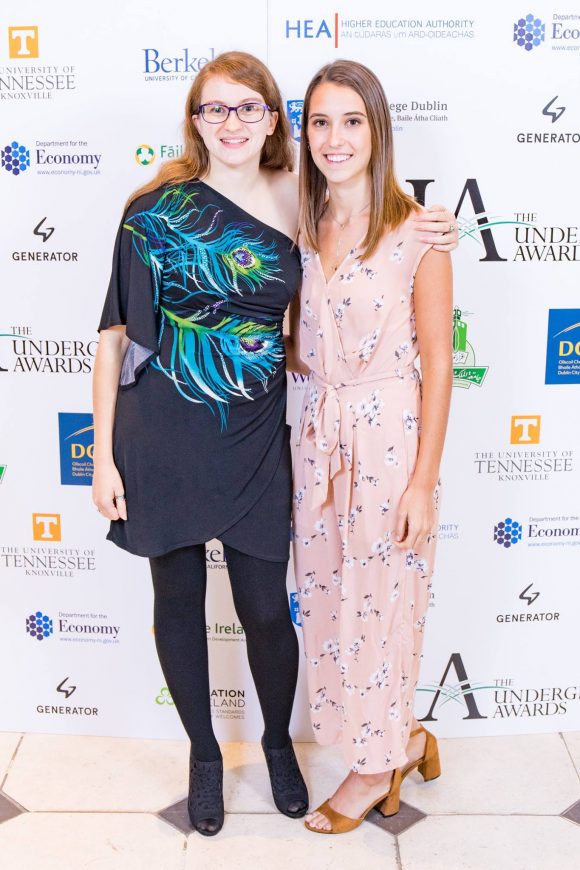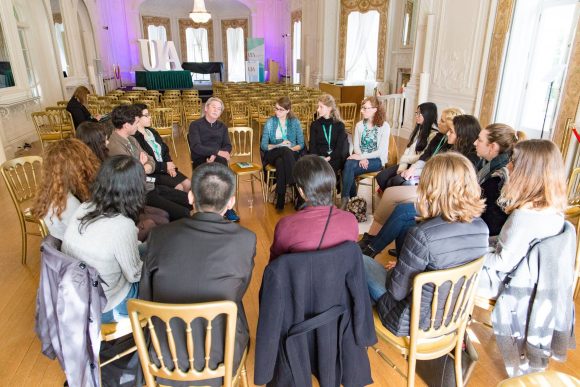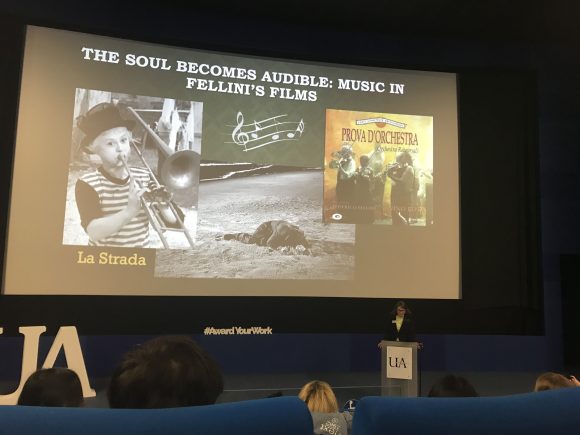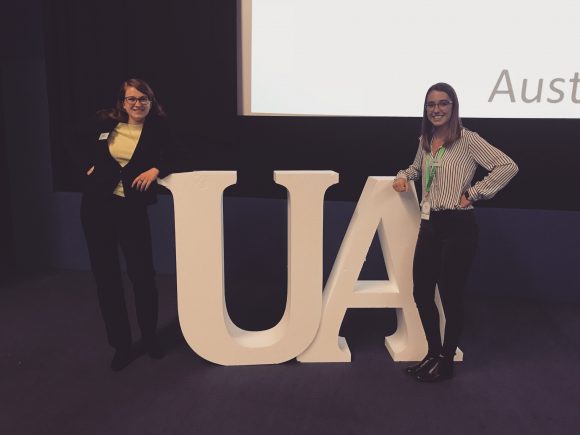Papers and plane tickets: Chapman Students Visit Dublin for Undergraduate Awards Undergraduates Paige Gulley, Shannon Anarella, and Sarah Lemay are Highly Commended Applicants of the 2017 Undergraduate Awards
January 3, 2018

It isn’t every day that a homework assignment turns into a trip Dublin. For Chapman University students, Paige Gulley, Shannon Anarella, and Sarah Lemay, undergraduate coursework became a mark of international academic distinction.
The Undergraduate Awards is the leading international undergraduate awards program that recognizes exemplary undergraduate work. This non-profit organization shares Chapman’s emphasis on global and culture connectivity, and seeks to bring together undergraduate students from all around the world. Valuing innovation, collaboration, ambition, impartiality, inclusiveness, and efficiency, the Undergraduate Awards invites both global student winners and highly commended applicants to the annual UA Global Summit in Dublin, Ireland.
OURCA is thrilled that among the highly commended applicants of 2017 are Chapman University students, Gulley, Anarella, and Lemay.
Senior Paige Gulley shared her UA experience with OURCA, from the meticulous revision and submission process, to her whirlwind trip to present her work in Dublin. Gulley’s project, entitled “The Soul Becomes Audible: Music in Fellini’s Films” began as a final paper for the Honors course The World of Fellini’s Cinema. As a French and History major, Gulley admits, “I often felt a bit out of my depth when we discussed the various cinematographic effects Fellini utilized.” However, she found her niche discussing the music of La Strada:
“I was instantly enchanted by the music of La Strada – it remains my favorite Fellini film. However, I couldn’t help but notice that the music was being dubbed, not played or sung onscreen, and this struck me as unusual. As we watched more of Fellini’s films, I noticed that this effect was repeated whenever a character played an instrument or sang. I also noticed that no critic or scholar mentioned this effect, though several did note Fellini’s dubbing of the dialogue of his films. It seemed to me that in La Strada, Fellini had found a way to demonstrate the heart of what music is and can do, in a way that is impossible to satisfactorily explain.”
Gulley’s project, it seems, followed as a natural progression of her academic interests. Though the submission process, “required a lot of revising,” she maintained that “overall, the process was not too stressful” thanks to the generous assistance of her faculty mentors, Dr. Federico Pacchioni, Dr. Justine Van Meter, and Dr. Julye Bidmead.

Of her experience in Dublin, Gulley confessed, “it seemed we’d just arrived when we were leaving!” She described the Summit as a unique immersion into the history of Dublin, visiting Farleigh House, City Hall, and Trinity College with exclusive tours unavailable to the general public. Gulley also discussed learning from various speakers, “including Christopher Lubbe, the former bodyguard to Nelson Mandela, who was by far the most moving and inspirational speaker we heard.” When asked about her most valuable take away from the Summit, she cited the many friendships she forged with students from all over the world: “It was amazing to be able to meet all these talented students from various parts of the globe and be able to connect with them, whether we shared a common discipline or not. Though it was only 3 days, I formed friendships that I hope will last a lifetime.”
Recent graduate and screenwriting major, Shannon Anarella, shared that her project had a similar inception to Gulley’s; it began as her Honors thesis born from the travel course Religion and Gender in Harry Potter. Her project, entitled “Harry Potter and the Identity Myth: Exploring Cultural Anxieties in a Post-9/11 World”, “borrows from Douglas B. Holt’s principles of cultural branding to deconstruct the Harry Potter phenomenon in light of the destabilizing forces of modern terrorism.” Anarella, a inaugural student of the Harry Potter travel course lead by Dr. Julye Bidmead, was invited back as a senior “Prefect.” She describes her relationship with Dr. Bidmead, her faculty mentor, as “richly rewarding” and identifies her as an “expert authority figure who could point [her] in different directions or help me to articulate some of the finer points.”
Concerning the submission process, Anarella explained, “My paper was more than twice as long as the Undergraduate Awards would allow, so I had to pare it down considerably.” She also mentioned facing a challenge in determining the appropriate category for her paper: “My capstone project needed to be interdisciplinary, so the final result could have been submitted to Literature, Psychology, Music, Film, & Theatre, or Sociology: Anthropology and Cultural Studies. In the end, I chose to submit to Literature.”
Though Anarella was unable to attend the Global Summit in Dublin, she hopes to continue research during her graduate education on the “intersections of psychology and popular culture.” Currently working as a research and teaching assistant in Forensic Psychology and Organizational Psychology here at Chapman, she notes that she plans on “applying to schools in the UK, in part, because of [her] experience traveling to London with Dr. Bidmead.”

As a Political Science major, senior Sarah Lemay’s research project was an extension of a research paper she completed for her sophomore Political Science Research Methods course. Her paper, entitled “The Decline of Political Trust: The Effects of News Media Exposure, Party Identification and Executive and Legislative Approval Ratings” explores “alternative factors that could be contributing to the decline of political trust in the United States and stresses the importance of understanding why political trust is in a continual downward spiral.”
Lemay recognizes Dr. Ann Gordon as her faculty mentor and emphasized, “I would not have been able to write this paper without her help.” As a student in Dr. Gordon’s research methods class, Lemay says she felt supported and inspired to pursue independent research based on her experience. Because “Dr. Gordon stressed the importance of undergraduate research and how beneficial it can be”, Lemay was also inspired to begin working as a Research Fellow at the Henley Social Science Lab, and has been conducting research there since her sophomore year.
Of the UA application, Lemay admitted, “The actual submission process was relatively simple. I simply had to fill some information about myself and then upload a copy of my paper. After I submitted I actually forgot about it because I was convinced that I was not going to receive an award.”
Her experience at the Global Summit in Dublin was “invaluable,” as she was able to meet so many like-minded international students with a passion for research. Beyond seeing the sites, hearing from inspirational speakers, and mingling with fellow distinguished undergraduates, Lemay says her most valuable take-away from the summit was “an increased passion to continue her research.” Upon graduation, Lemay is hoping to continue her work with a Fulbright fellowship to student refugee integration programs in Canada. Ultimately, her goal is “to work for a major international organization like the United Nations.”
 All three Highly Commended Applicants offer advice for students considering submitting their undergraduate coursework for the 2018 Undergraduate Awards.
All three Highly Commended Applicants offer advice for students considering submitting their undergraduate coursework for the 2018 Undergraduate Awards.
Gulley says, “Take advantage of this opportunity — since they’re looking for papers written for classes, you don’t have to write a whole new paper or do new research to submit. All you have to do is edit a paper you’ve already written. And don’t be afraid to ask your professors and/or Dr. Bidmead for help, either with editing or the general process — they’re your most valuable resource!”
Anarella advises, “My advice is to work with a mentor before submitting your work. It could be the professor who taught the course or it could be another figure who can provide an outsider’s perspective. I would always recommend getting a fresh set of eyes on your work and taking the time to make your own revisions — after giving yourself a break to reset. Sometimes the best thing you can do for a project, especially one as involved and time-consuming as a paper, is to walk away. When you return to it, you’ll be surprised at how many things will stick out to your or new insights you will gain.”
Lemay offers, “My main piece of advice would be to just submit! I did not think I had a chance of winning, but I decided to submit on a whim and it was a great decision. Even if you think you will not win, just submit anyways, I met so many other students at the conference that were convinced they would not win, but decided to submit anyways. The application process is relatively straightforward and Julye Bidmead is always available to help you. Do not doubt yourself and submit a paper that you are proud of!”
Are you interested in submitting for the 2018 Undergraduate Awards? Curious about other incredible fellowship, scholarship, and study abroad opportunities?
Contact OURCA and the Fellowships and Scholars Programs for more information!
Follow OURCA on Facebook to stay up to date on events and announcements that you don’t want to miss!